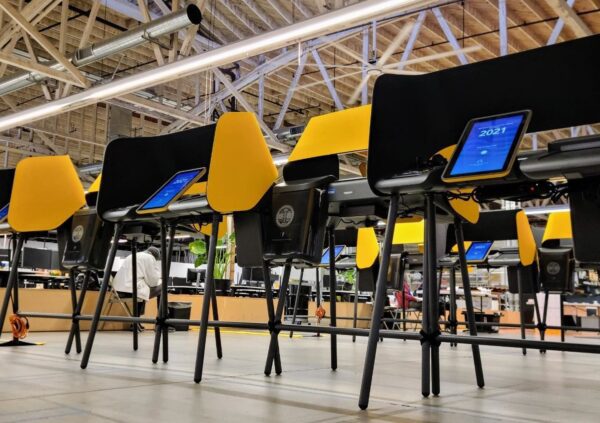After becoming the first American city to host the Summit of the Americas since Miami did so in 1994, Los Angeles concluded their successful summit conference on Friday.
President Joe Biden and Vice President Kamala Harris — along with several other local leaders — participated throughout Los Angeles County to discuss important issues that continue to impact the Western Hemisphere, such as climate action, supply chains, migration management and more.
In case you missed anything essential from the summit, here’s an overview of the most important developments that transpired during this week’s conference.
‘Economy of the Future’ — What does Biden mean by that?
As working sessions began at the Summit of the Americas in downtown Los Angeles, Biden Thursday challenged business leaders to join with Western Hemisphere nations to prepare the global economy for the coming decades through investments in supply chains, clean energy and the “digital future.”
Speaking at the CEO Summit of the Americas gathering of business leaders at the Intercontinental Hotel, Biden said the “economy of the future” will depend on decisions made Thursday.
“The economy of the future will increasingly belong to those who place a premium on resilience and reliability, who invest over the long term and strengthen supply chains now to mitigate the impact of future shocks before they hit,” Biden told the gathering.
Biden told the business leaders that governments attending the Summit of the Americas will be making commitments to achieve “sustainable and equitable growth” across the region. He said those decisions will include improved supply chains, developing a “shared framework for our digital future,” advancing action against climate change, speeding the transition to clean energy, combating food insecurity and managing “safe and orderly migration.”
“My challenge to all of you is, if you step up and play a bigger role in driving inclusive, sustainable and equitable growth in the 21st Century, a lot is going to happen,” he said. “What more can you do to engage in these issues that shape our future?”
‘Declaration on Migration and Protection’ signed at Summit
Leaders attending the Summit of the Americas Friday signed the “Los Angeles Declaration on Migration and Protection,” described by a White House official as a pact to pursue a “comprehensive” approach to addressing the crisis.
The declaration “will lay out in four pillars an approach to a migration management that is rooted in shared responsibility and involves source countries, transit countries and destination countries for the first time ever,” White House press secretary Karine Jean-Pierre told reporters aboard Air Force One last Wednesday.
Biden said Thursday at the summit’s opening plenary session the declaration “will bring our nations together around a transformative new approach to invest in the region solutions that enhance stability, to increase opportunities for safe and orderly migration, to crack down on the criminals and human traffickers who prey on desperate people, and coordinate specific, concrete actions to secure our borders and resolve the shared challenges.”
Harris announces trio of initiatives targeting Central American migration
Targeting a key discussion topic at this week’s Summit of the Americas, Vice President Kamala Harris announced three efforts aimed at stemming the flow of migrants out of Central America, most notably an additional $1.9 billion in private-sector investments in the region designed to provide economic opportunities for residents where they live.
Harris was scheduled to discuss the initiatives at a trio of appearances in the area last Tuesday, including roundtable discussions with female leaders and business executives and a speech at a women’s empowerment event, according to the White House.
Harris has been tasked by Biden to tackle the immigration issue, most notably by addressing what are believed to be root causes of the problem that prompt young migrants to flee their home countries. A senior administration official told reporters the central theory of addressing that issue is the belief that residents in El Salvador, Honduras and Guatemala don’t want to leave their homes. Therefore, “if you can provide them hope and opportunity, particularly economic opportunity, there’s a greater chance that they will remain there,” the official said.
Biden goes to Port of LA as inflation reaches 40-year high
On the day the U.S. inflation rate hit a 40-year high, President Joe Biden traveled to the Port of Los Angeles Friday to discuss efforts to streamline global supply chains and counter rising prices, painting the issue as a worldwide problem fueled largely by Russian aggression in Ukraine.
Speaking aboard the Battleship Iowa Museum in San Pedro, Biden referred to “Putin’s Price Hike” for driving up the cost of energy and food, which he said accounted for the vast majority of 8.6% inflation rate in May compared to the same month a year ago.
“Every country in the world is getting a big bite of this inflation, worse than we are for the vast majority of countries around the world,” Biden said. “But make no mistake about it, I understand inflation is a real challenge to American families. Today’s inflation report confirmed what Americans already know. ‘Putin’s Price Hike’ is hitting America hard.
“Gas prices at the pump, energy and food prices account for half of the monthly price increases since May. Inflation outside of energy and food — what the economists call core inflation — moderated over the last two months. Not enough, but it moderated. It’s come down. But we need it to come down much more quickly.
“My administration is going to continue to do everything we can to lower prices for the American people,” he said.
California and Canada create climate action partnership
Gov. Gavin Newsom met with Canadian Prime Minister Justin Trudeau at the Summit of the Americas in Los Angeles to enter into a partnership aimed at advancing climate action.
Newsom and Trudeau held a bilateral meeting at the California Science Center, where they signed a Memorandum of Cooperation to fight climate change, protect the environment, build climate resilience, advance zero-emission vehicles and reduce pollution and plastic waste. The partnership includes a commitment to engage with indigenous people in biodiversity conservation.
“We can’t fight the climate crisis on our own — we need to work together with partners all across the globe to achieve humanity’s most important task: saving our planet,” Newsom said. “This partnership with Canada is a vital step on California’s path to a cleaner, greener future and is the latest expression of our shared values. Together, we are building a more sustainable and resilient future for millions and lighting the path for other nations and nation-states to follow our lead.”
Garcetti, LA civil rights hosts roundtable with mayors from across the Americas
Los Angeles Mayor Eric Garcetti and the city’s Civil + Human Rights and Equity Department hosted a panel discussion Wednesday with U.S. State Department officials and mayors from cities throughout the Americas to discuss violence prevention strategies as Los Angeles hosts this year’s Summit of the Americas.
“Leaders from across the Americas have come together this week around solutions to our shared challenges. including preventing violence in our cities — a top priority for every mayor,” Garcetti said. “This gathering provided a meaningful opportunity for us to share strategies for building the trust that is essential to public safety, creating resilient networks within and across communities, and ensuring our residents have access to the resources they need to thrive.”
The panel discussion included mayors from Villa Nueva, Guatemala; Puerto Barrios, Guatemala; Moravia, Costa Rica; Bogotá, Colombia; Port of Spain, Trinidad; Denver, Colorado and Chattanooga, Tennessee. It was moderated by the LA Civil Rights Director of Policy and Enforcement Joumana Silyan-Saba.







